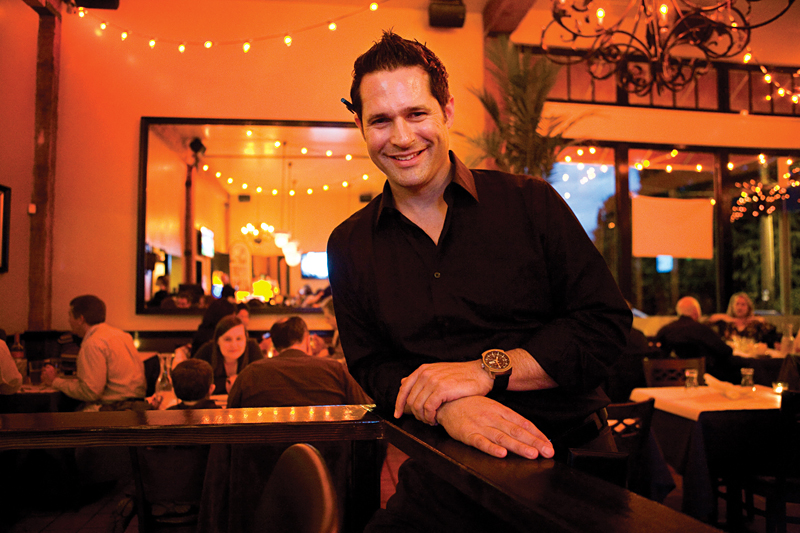With Greece’s festering debt crisis threatening to topple the Eurozone, citizens of chilly nations to the north have begun tut-tutting about the perceived Greek work ethic. Telling bawdy jokes, basking in the sun with a jug of wine, and breaking into a hasapiko step at the first strum of a bouzouki seemed cute when Zorba did it, but that was back before upholding Dionysian traditions on the edge of the Mediterranean could cost a copper miner his job in Finland. Failing banks have made a zest for life unseemly.
Fortunately for residents of Ravenna, zany Greek fun hasn’t gone out of fashion on this side of the Atlantic. Taverna MaZí (rhymes with Ponzi) is the two-month- old neighborhood hive run by Demetri Georgakopoulos, a restaurateur who’s been trying to shake up Seattle’s image of Hellenic cookery since he opened the proudly gyro-free Porta Greek Tavern in Eastlake a decade ago.
There is a “neo classic yeero” at MaZí—although the standard shredded-lettuce treatment is available “by request only”—but the sandwich is in no way a signal that Georgakopoulos has given in to culinary stodginess. Fans of saganaki, pastitio, and rice pudding will have to save their cravings for their next visits to a Greek-American diner. “The opa is in the food,” instructs the menu, which identifies Georgakopoulos as “conductor of the madness.”
MaZí can simultaneously scorn flaming cheese and forge its own weirdly North American mashups. Many of the dishes swell with flavors more commonly associated with meals featuring enchiladas and refried beans than feta and gigantes. Bartender Joseph Roach’s fraternity row of cocktails made with pomegranate liqueur and vodka even includes a Greek margarita, its patronymic claims stiffened by cucumbers. On the food side of the menu, there’s cilantro here, avocado there. And the secret ingredient is frequently booze. Thousands of miles from a homeland racked by monetary woes, MaZí has put Greek cuisine on a party bus headed south.
The kitchen’s blithe attitude is considerably less charming when it infects the service staff, as it did on my visits to the restaurant. While a lone bartender sorted checks and fiddled with his point-of-sale monitor, I spent 10 minutes awaiting a nod acknowledging my presence. Water glasses on my table were left dry even longer: My companion and I finished two courses before she finally rebelled against my game of “Let’s see how long it takes” and motioned to a server for a first pour.
Granted, the servers were pleasant, but never nearby when a plate needed clearing or an order needed taking. They were also prone to taking aggravating shortcuts, such as offering baklava ice cream when we asked about after-dinner options instead of revealing the existence of a complete dessert menu. The busy restaurant’s dozen tables are often configured to accommodate very large parties, and there simply aren’t enough staffers on the floor to tend to every request for more pita bread and another bottle of wine.
Still, MaZí’s vaguely Continental dining room, situated where La Piazza once stood, is a lovely space in which to languish. The light is warm and adequately scant to encourage lovers and foil fuddy-duddies who habitually photograph every dish. The corner restaurant is windowed on one side, but the other walls are hung with stately mirrors of various sizes, reflecting the amber glow of strands of marquee lights that extend from a central, twisty wrought-iron chandelier. There are deep blue tablecloths on the tables, and Greek folk music plays on the stereo.
Permanent lettering on the restaurant’s front window advertises the Greek margaritas, but MaZí’s best cocktail is a nervy blend of ouzo, limoncello, mint, sour mix, and 7-Up that’s crisp and tart and bubbly. There are also Greek wines, including a selection of retsinas: white wines flavored with the same sticky pine product violinists apply to their bows and ballerinas rub on the soles of their shoes. “You have to try it once,” my server prodded me.
Consistent with that ethos, MaZí’s menu is designed for diners in experimental moods, with two-thirds of it devoted to dips, salads, and small plates meant to be shared. Some dishes are better than others, but the vast majority of them are clustered around the “acceptable” notch on the food-quality meter. In two visits, I didn’t encounter a single dish so objectionable that its flaws dominated conversation, but neither did I find a dish of transfixing excellence. The menu’s Latin overtures aren’t sufficiently pronounced or sustained to stimulate any serious philosophizing about fusion and the future of Greek cooking, but, as Zorba said, “You think too much. That is your trouble.”
The brain doesn’t have to fire a single synapse to make sense of the feta fries, a fancified version of the garlic fries served at Safeco Field. They are all exterior crunch, but trimmed with flecks of feta and doused with enough garlic oil to make a breath-mint manufacturer very, very happy. A young woman at an adjacent table made a meal of the fries and a glass of wine and seemed thoroughly content.
Other enjoyably mindless starters include the lineup of dips, which are uniformly easy to like. Served with triangles of soft wheat pita, they include a slightly frou-frou whipped feta concoction, embellished with a sour-cherry reduction; a satisfyingly salty taramosalata, lush as the cheese spread but made pink by carp roe; and an avocado-spiked hummus seeded with tomatoes and garlic for a guacamole effect.
For diners assembling an all-first-course feast, the appetizer section includes plenty of meaty choices. Stout housemade pork sausages smack of fennel and the sharp flavors of citrus liqueur. Drunken prawns represent a more brazen use of the liquor cabinet, with marginally overcooked shrimp swimming in a puddle of oniony tomato cream sauce energized by ouzo. It’s not a dish for the anise-averse.
There are a few clunkers among the starters, including panko-breaded fried smelts that sound alluringly cosmopolitan but turn out to be thickly breaded fish sticks for the sustainable-seafood crowd. An accompanying tartar sauce jury-rigged with capers adds little glamour to the workaday dish. Braised octopus is advertised as “grilled to the order,” perhaps a tall order in a restaurant as reliably overwhelmed by guest traffic as MaZí. My order was nearly burnt.
A number of good ideas at MaZí are similarly undermined by overcooking. A Greek taco of pulled lamb, braised in wine and garnished with onions, feta, and cilantro, was disagreeably dry. Even drier was a glum roasted chicken that couldn’t be salvaged by lemon juice, although the garlic-plumped potato wedges on the plate provided a welcome distraction.
The standout entrée at MaZí is a homespun braised lamb shank, sunk in a thicket of cinnamon-scented orzo and roasted tomatoes. The lamb would probably fall off the bone if a gentle gust of wind blew through the dining room; the meat is deeply flavored and the pasta perfectly cooked. It’s not a visionary preparation, but a classic Greek dish bound to keep bringing pleasure to easygoing eaters long after credit default swaps have been forgotten. The lamb makes the point Georgakopoulos no doubt intended when he first issued his no-gyro decree: The best Greek dishes are not pita-wrapped burritos for harried eaters who can’t be bothered with forks and knives. They’re the dishes that pair with meandering conversation, a glass of resinated wine, and a dining room teeming with the contagious vim of Taverna MaZí.
Price Guide
Houmos $6
Feta fries $7
Fried smelts $9
Drunken prawns $10
Roasted chicken $16
Lamb shank $20








